Events Fall 2023 - Spring 2024
All events at the Mandel Center for the Humanities are subject to health standards, precautions and protocols as determined by Brandeis University and the State of Massachusetts.
Event Details
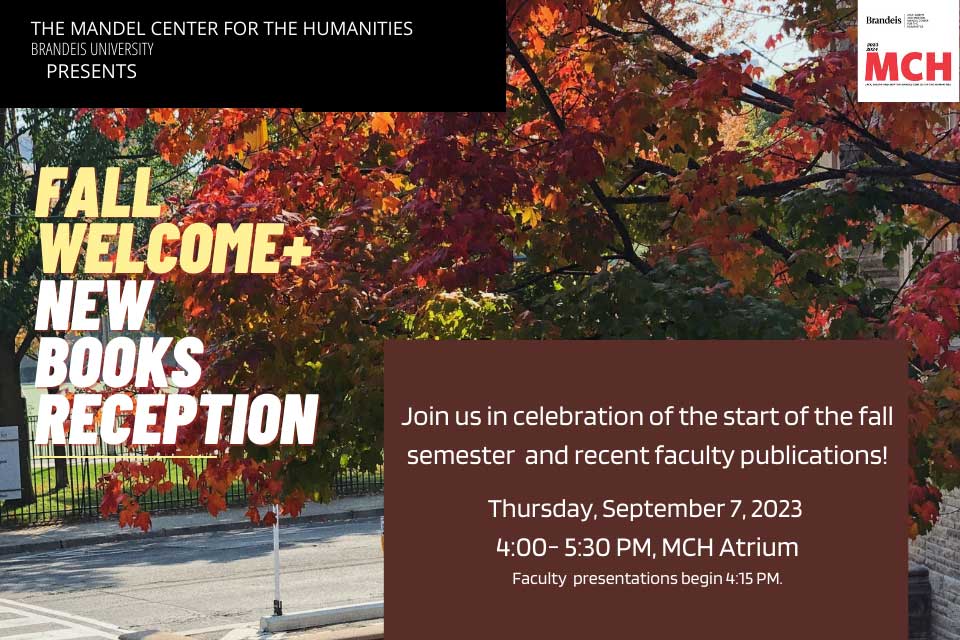
September 7, 2023
Mandel Atrium (4:30pm - 5:00pm)
Our annual autumn social gives humanists at Brandeis a chance to meet other members of the Brandeis community, and recently published authors a chance to introduce their new books to the Brandeis community.
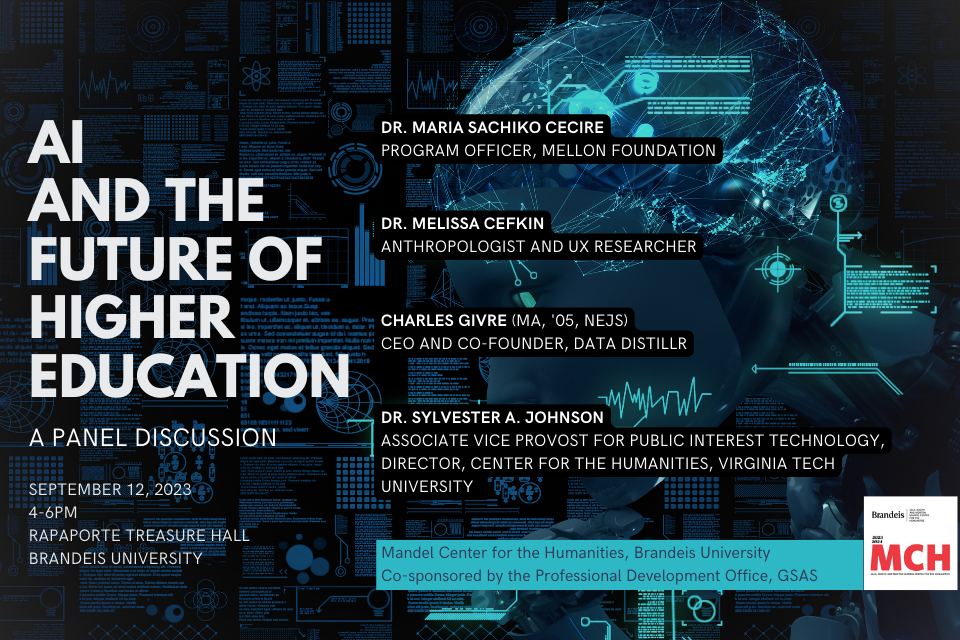
September 12, 2023
Rapaporte (4:00pm - 6:00pm)
A panel discussion on how AI will affect collaboration and research in higher education institutions, featuring Dr. Maria Sachiko Cecire (Mellon Foundation), Dr. Melissa Cefkin (Waymo), Charles Givre (DataDistllr) and Dr. Sylvester Johnson (Virginia Tech).
October 17, 2023
G12 (7:00pm - 9:00pm)
Dr. Emilie Diouf (Brandeis, English) hosts a viewing of Alice Diop's Award winning film St. Omer before the panel the following day.
October 18, 2023
Golding Judaica 101 (2:30pm - 3:50pm)
Professor Emilie Diouf leads a conversation about this heartbreaking film.
Panel details:
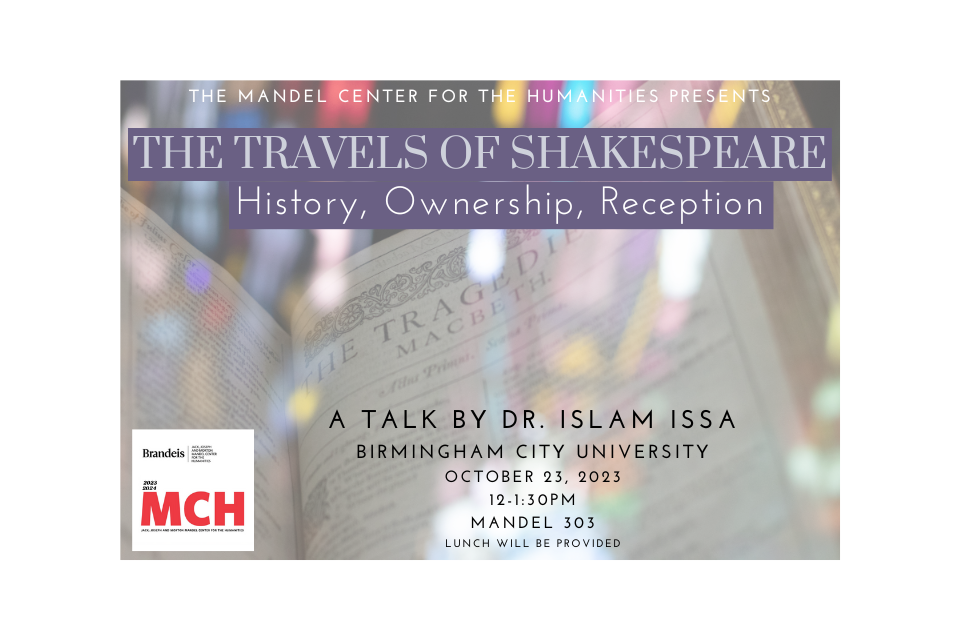
October 23, 2023
Mandel 303 (12:00pm - 1:30pm)
In this wide-ranging talk, author and broadcaster Prof. Islam Issa uses Shakespeare as a conduit to explore the vitality and limitations of our interpretative practices, querying the roles and insights of cultural history, reception theory, canonicity, mythology, and popular culture. By exploring such examples as Osama bin Laden’s diary entry on Shakespeare, and the swastika flag that flew over Shakespeare’s birthplace, this talk advocates the importance of recognizing the reciprocal relationship between literature and history, arguing for a differentiation between the text and the work.
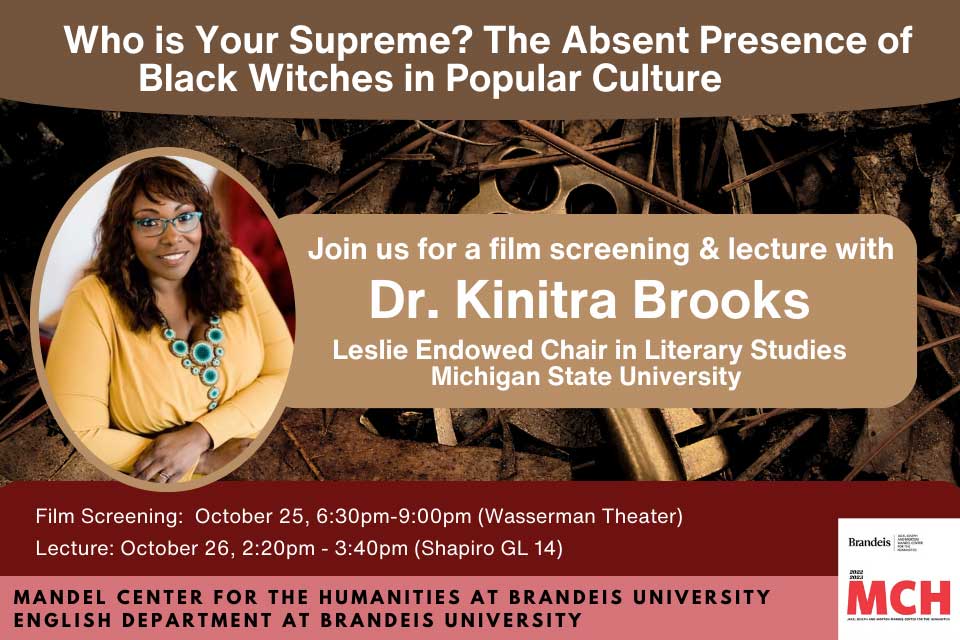
October 25, 2023
Wasserman Theater (6:30pm - 9:00pm)
Dr. Kinitra Brooks introduces the film the Skeleton Key and Dr. Brandon Callender leads discussion after the viewing. The film will also be a launching pad for tomorrow's lecture by Dr. Kinitra Brooks.

October 26, 2023
Shapiro Science Center GL-014 (2:20pm - 3:40pm)
Using the film The Skeleton Key, Dr. Kinitra Brooks discusses religions of the Black Atlantic and their portrayal in the gothic/horror genre. Co-hosted with the Department of English.
Following the previous night’s film screening, Kinitra Brooks will offer a lecture on the film, which will include a larger conversation around phobias about Black Atlantic religions. During the discussion, Brooks will be bringing in and passing around certain items related to roots work and the conjure tradition that she will be discussing, focusing upon the fearful cultural stigmas around them and their misrepresentations within horror films.
November 3, 2023
Brown 224 (12:45pm-5:00pm)
Part 1: Artist Talk and Introduction to the Project (12:45 - 1:45pm)
The Memories of Fruits is a large-scale research-based art project that explores themes of
migration, diaspora, and memory by activating participant’s sensorial and affective memories of
fruit. The project focuses on people’s hands as they physically describe memories of fruits that
from the Caribbean to explore the emotional bonds they evoke in people.
Part 2: Workshop - Collective Activation of the Memories of Fruit (1:45 - 4:00pm)
Sensory memories are activated through a workshop led by Claremi. The stories, experiences, memories, and desires that emerge through this workshop process are then documented and explored through photographs, video, and text. While the memories and stories that make up the project evoke the centrality of sensory knowledge, they also encourage us to consider issues pertaining industrial agriculture, the migratory pathways taken up by fruits and humans alike, and the structural causes that cause feelings of disconnection and absence that exist alongside the meaningful memories of home and family of those in the diaspora.
Part 3: Discussion (4:00 - 5:00pm)
We will end with a short discussion and reflection on the project and the experience of the workshop.
Please note: The Artist Talk and Workshop will last from 12:45 to PM. Guests can join for all the workshop or join us for one of the individual parts.
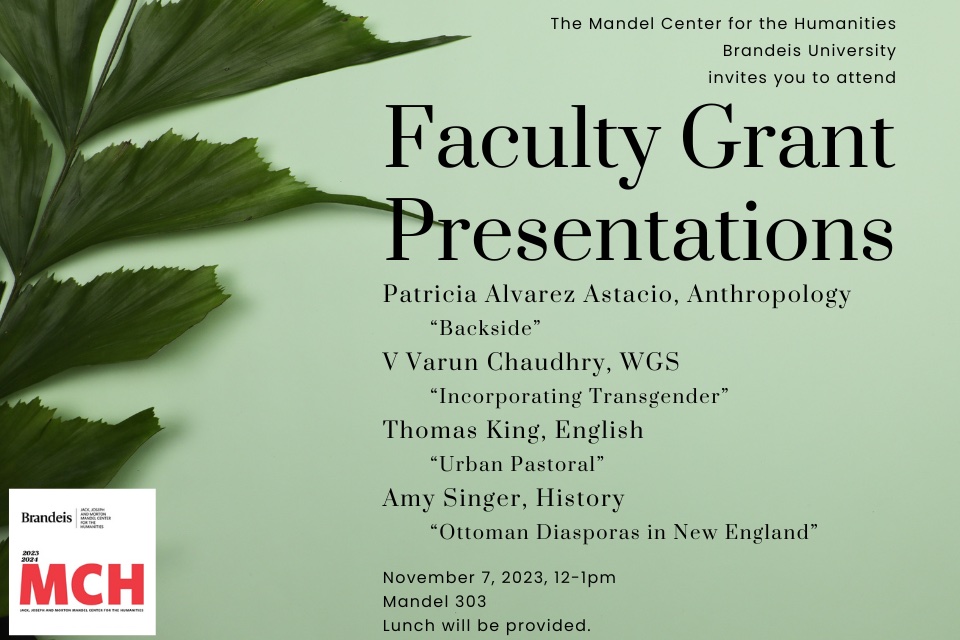
November 7, 2023
Mandel 303 (12:00pm - 1:00pm)
Please join us for lunch as we hear project updates from Brandeis faculty who have received 2023-24 Mandel Grants.
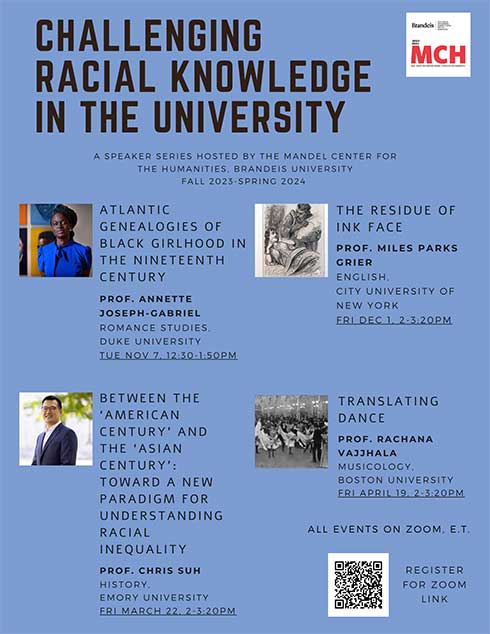
Zoom (12:30pm - 1:50pm)
Dr. Annette Joseph-Gabriel, John Spencer Bassett Associate Professor of Romance Studies and Associate Professor of Gender, Sexuality and Feminist Studies at Duke University will discuss research from her new project, Enslaved Childhoods: Survival and Storytelling in the Atlantic World. This event is the first offering in a new series that will continue into the Spring semester, and consists of a presentation, followed by a further conversation.
'Challenging Racial Knowledge in the University' is a yearlong speaker series sponsored by the Mandel Center for the Humanities. The series seeks to foster expansive cross-disciplinary conversations around race, with a particular focus on original and unique scholarly methodologies. The further aim is to generate new ideas that more effectively challenge white bias and other oppressive supremacist structures that impact our classrooms and our wider communities, and to open up new patterns theoretically, pedagogically, and creatively.

December 1, 2023
Zoom (12:30pm - 1:50pm)
Register at the Challenging Racial Knowledge in the University series webpage.
'Challenging Racial Knowledge in the University' is a yearlong speaker series sponsored by the Mandel Center for the Humanities. The series seeks to foster expansive cross-disciplinary conversations around race, with a particular focus on original and unique scholarly methodologies. The further aim is to generate new ideas that more effectively challenge white bias and other oppressive supremacist structures that impact our classrooms and our wider communities, and to open up new patterns theoretically, pedagogically, and creatively.
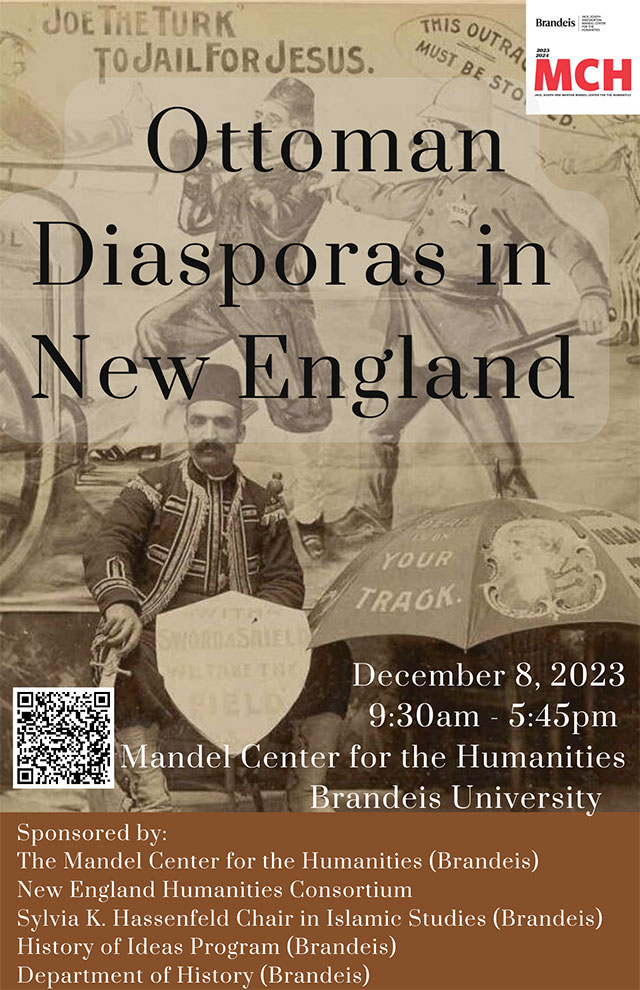
December 8, 2023
TBD
Join us for a Mandel event with Professor Amy Singer.
From the 1870s to the 1920s, millions of people worldwide moved as economic migrants and refugees from war and violence. Tens of thousands came from the Ottoman Empire and ex-Ottoman lands to "America,” with its promises of security, economic riches and religious freedom. Newcomers included Armenians, Greeks, Jews, Lebanese, Levantines, Syrians, Turks and others. Many of these former Ottoman subjects originally arrived through the port of Boston and spread out to form a diverse Ottoman diasporic population across the region.
While individual communities have been studied, little attention has been given to the connections among this immigrant demographic through their shared experiences as former Ottoman subjects now residing in the U.S. In part, this is due to the circumstances of their departures, which ranged from violent expulsion to well-organized migration. The over-arching goal of ODNE is to create connections between Ottoman studies, a vast field seemingly remote in time and space, and the students, scholars and local communities of New England.
In its first stage during the coming year, ODNE focuses on: source and scholarship discovery and cataloging; community identification, mapping and connections; student engagement through a History Lab course in which students join in building the project; and a summary workshop of research and cultural presentations by and for the scholar, student and community stakeholders in the project.
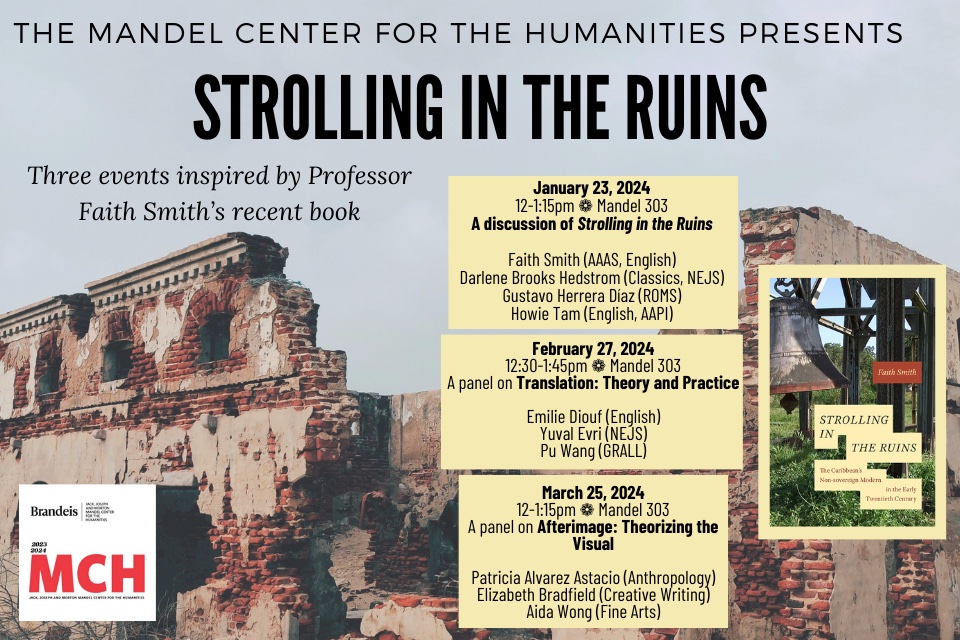
January 23, 2024
Mandel 303 (12:00pm - 1:15pm)
Speakers: Faith Smith, Darlene Brooks Hedstrom, Gustavo Herrera Díaz, Howie Tam
The title of Professor Faith Smith's new book offers a reconsideration of the stroller who, like the flaneur, suggests a male, bourgeois figure paradigmatic of European modernity. What would the stroller look like when transported to a Caribbean city, or when transformed into a woman, a sex worker, someone from the working class? What new forms of strolling might this figure undertake and what new perspectives and stories might such strolling enable? How might such an urban figure offer a new account of post-catastrophic moments in the history and the present? We invite panelists to take up these questions as they relate to their own work. How might "strolling in the ruins" both speak to the early 20th-century Caribbean as well as to other contexts where catastrophe coexists with everyday place-making and gendered and queer subjectivities? How might "the mundane act of walking" (78) be seen as a new mode of modern belonging in spaces riven by the histories of colonial violence?
RSVP here to receive the pre-circulated reading and to be entered into a raffle to win a free copy of Strolling in the Ruins. The winners will be announced at the event.
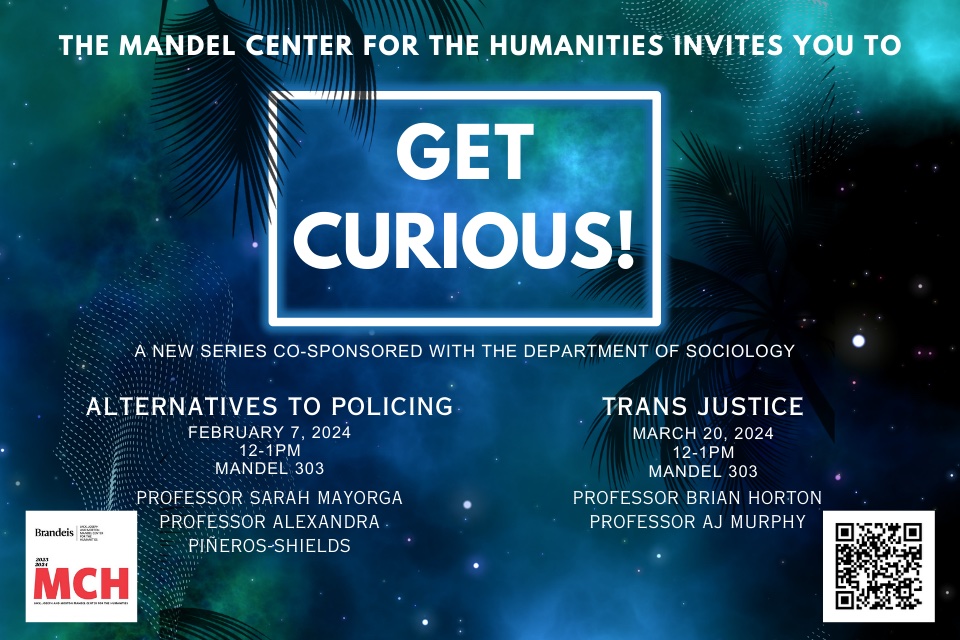
February 7, 2024
Mandel 303 (12pm - 1pm)
Speakers: Sarah Mayorga and Alexandra Pineros-Shields
Get Curious! is a new speaker series organized and co-sponsored by the Mandel Center for the Humanities and the Department of Sociology. The series aims to offer brief, one-hour introductions to important current topics that students and community members might be interested in but haven’t had the opportunity to take a class on. Covering a range of topics, both national and global, and led by two faculty presenters from different fields, the idea is to both pique and satisfy students’ curiosity.
February 8, 2024
This semester, the Brandeis Humanities Council is reading New Education: How to Revolutionize the University and Prepare Students for a World in Flux. There will be a Zoom discussion with author Cathy N. Davidson (CUNY).
This seminar is by invitation only. For inquiries please contact Esha Senchaudhuri (esenchaudhuri@brandeis.edu).
February 14, 2024
Mandel 303 (12pm - 1:00pm)
Speakers: Joseph Yauch and Hong Zhang
How is identity shaped for those who labor on the land, and how do these identities shape our narratives about industrialization and economic history? Mandel Dissertation Innovation Award winner Hong Zhang (Anthropology) and Mandel Graduate Research Grant winner Joseph Yauch (History) discuss how their projects intersect with the theme of land, labor and identity.
From Joseph Yauch's project description: "My research fuses Native, environmental, and labor histories to investigate 19th and 20th century logging in Northern Maine. By comparing the different harvesting strategies, economic incentives and labor structures of settler agriculture, industrial lumbering, and industrial pulp and paper production, I complicate narratives of industrialization and settler colonial expansion."
From Hong Zhang's project description: "My dissertation examines the everyday lives of the Chinese miners brought to the camp by the Chinese state-owned mining company Zijin to Buriticá, Colombia, in 2019. As the core intersection of the company, the Chinese state, the Colombian state, Colombian workers, and the local communities in the mining area, these Chinese workers provide crucial knowledge to my research on how Chinese mining complicates the economic, cultural and ecological violence engraved in Latin America by neoliberal extractivism since European colonization, and investigates Chinas role in the the global economy and ecology."

February 27, 2024
Mandel 303 (12:30pm - 1:45pm)
Speakers: Emilie Diouf, Yuval Evri, Pu Wang
Panelists will discuss their recent work on or around translation. Presenting one text or problem, the panel asks: What are major questions that appear around translation processes and practices? How is translation an act of resignification, and what local and global forces must be contended with to render a text legible beyond its immediate language? How do specific acts of translation speak to broader global concerns?
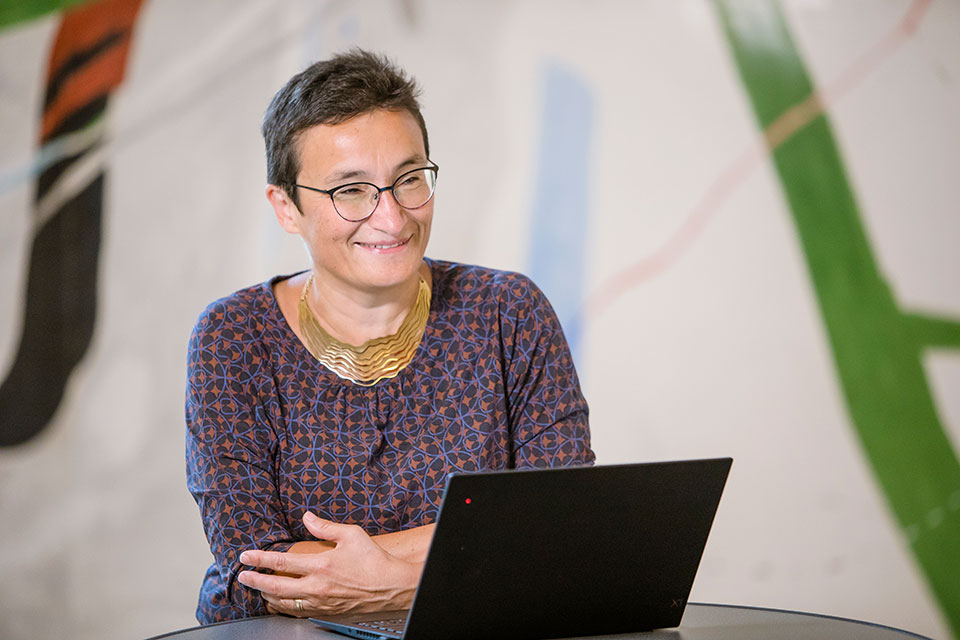
March 6, 2024
Mandel 303 (1pm - 2:30pm)
Increasingly, companies spearheading artificial intelligence technology are relying on those with humanities expertise to engage in discussions about the design and deployment of AI. In recent years, corporations ranging from Boeing to Microsoft have hired philosophers, anthropologists, sociologists and experts in cultural studies to collaborate with technologists on the development of new AI tools. Even governments are calling on humanistic expertise as AI-innovations disperse through societies.
What is the role of humanities in these spaces? What kinds of questions do humanists confront? Why is their expertise needed? In this workshop, Professor Viriginia Dignum will guide you through real-life examples of AI problems that have benefited from the critical, interpretive and analytical capabilities that humanities training can supply.
March 11, 2024
Rapaporte Treasure Hall 303 (5:30pm - 7:00pm)
First Mandel Lecture by Jackie Wang
Nauru is the world's smallest island nation. Across the nineteenth and twentieth centuries, Nauru came under the colonial rule of Germany, Great Britain, Australia, New Zealand, and Japan, who exploited the island for its phosphate resources and geostrategic location in the Pacific. After the depletion of phosphate reserves in the 1990s, Nauru has struggled to find new revenue streams to replace terrestrial mining revenue and has begun to work with Canadian-owned The Metals Company (TMC) to explore deep sea mining. The “green energy” transition has launched a scramble for minerals such as lithium, cobalt, copper, and nickel, which are essential for electric vehicle batteries. Yet little is known about how the mining of polymetallic nodules on the seabed of the Pacific’s Clarion Clipperton Zone will affect delicate ocean ecosystems. This lecture will examine the complex interplay between colonial history, indigenous politics, and environmental advocacy in the context of deep sea mining. Nauru is an island that has suffered from extreme environmental degradation caused by the legacy of colonial-capitalist extraction. In order to maintain their sovereignty and ward off climate migration, Nauru has viewed deep sea mining as one of the few options they have for survival. Yet other indigenous leaders across the region of the Pacific have strongly opposed deep sea mining. Using the frameworks of racial capitalism and indigenous ecologies, this lecture will explore the contours of this debate between environmental activists and indigenous communities in the Pacific.
March 12, 2024
Mandel 303 (5:30pm - 7:00pm)
Second Mandel Lecture by Jackie Wang
How has the element of water irrigated the imagination, inspiring works of poetry that attempt to capture fluidity, both in form and content? Using Kamau Brathwaite’s concept of tidalectics as a point of departure, this lecture will explore the theme of water, with an emphasis on the role of water in the literary and ethical imagination across poetic traditions, particularly Caribbean and Black diasporic poetry and the writings of authors such as Dionne Brand and Édouard Glissant. Contrasting his philosophy with Hegel’s dialectics, Brathewaite’s concept of tidalectics draws from the syncopated rhythm of lapping waves, “humble repetitive ritual actio(n),” and the prosody of poetic language to understand the Caribbean experience. The lecture will examine the multifaceted nature of water symbolism: water as a giver and taker of life, the ocean as a graveyard, the sea as history, water as the principle of flux, and water as a geographical boundary and metaphorical boundary between states of existence.
March 13, 2024
Mandel 303 (12pm - 1:30pm)
Third Mandel Lecture by Jackie Wang
Between 1923 and 1936 the French novelist and mystic Romain Rolland exchanged twenty letters with Sigmund Freud. Inspired by his exchanges with Rolland, Freud elaborated the concept of “oceanic feeling” in his 1930 work Civilization and Its Discontents. In the book, Freud characterizes the "oceanic feeling" as an experience of boundlessness, signifying a regression to the infantile state where the infant perceives no distinction between itself and its mother. In contrast, Rolland views the "oceanic" as an affective state underlying all religious experience. This lecture will explore the notion of "oceanic feeling" within psychoanalytic, mystical, and philosophical discourses, with the aim of exploring how the dissolution of the self can give way to new social forms and affective states. The talk will examine psychoanalytic debates surrounding oceanic feeling, as well as Spinozist interpretations of oceanic feeling and its societal implications, which emphasizes the potential for these states to form the groundwork for collective social forms.

March 20, 2024
Speakers: Brian Horton and AJ Murphy
Mandel 303 (12pm - 1pm)
Get Curious! is a new speaker series organized and co-sponsored by the Mandel Center for the Humanities and the Department of Sociology. The series aims to offer brief, one-hour introductions to important current topics that students and community members might be interested in but haven’t had the opportunity to take a class on. Covering a range of topics, both national and global, and led by two faculty presenters from different fields, the idea is to both pique and satisfy students’ curiosity.

March 25, 2024
Mandel 303 (12:00pm - 1:15pm)
Speakers: Patricia Alvarez Astacio, Elizabeth Bradfield, Aida Wong
This panel asks how visual images operate in different kinds of scholarly and creative production. Centering on the afterimage, or the sensory impression left after having encountered a powerful visual image, the panel explores the imprint of images as a form of sensory knowledge. Panelists will be asked to present one or a series of images that has featured in their work and speak on how that image both invites and challenges interpretation. Some questions that might be addressed are: What does it mean to translate images into text? What is irreducible about the visual image? How can sensory knowledge be part of academic scholarship?
April 2, 2024
Speakers: Jessi Brewer and Sarah Han
Mandel 303 (12:15pm - 1:15pm)
How does law and legality shape people's perceptions of themselves and their social identities? In this lunchtime talk, Jessica Brewer (English) and Sarah Han (Anthropology), winners of Mandel's 2023 Graduate Dissertation Innovation grants, discuss their research.
From Jessica Brewer's project description: "As the turn of the 19th century saw a shift in prison architecture and reform, the emergence of solitary confinement and increasing incarceration of the poor, I aim to examine mainstream authors and alternative/street literatures to map how social narratives develop around incarceration. My research asks: how did Victorian narratives create social others and how did these narratives affirm/challenge public opinion and policy? How do dominant narratives continue to shape social attitudes about specific groups? And can narratives be reshaped for social good? What tools do the Victorians offer us for modern social, political and/or police reform?"
From Sarah Han's project description: "Originating from the Balochistan region spanning Western Pakistan, Eastern Iran, and Southern Afghanistan, some Baloch have obtained Emirati citizenship, while other Baloch have passports from their "country of origin," as part of the nearly 90% of non-citizen workers living in the UAE on temporary visas, and still others remain document-less and stateless. Across all the three documentary categories, Baloch women share in the experience of being perceived as Arab and assumed to be Emirati citizens because they wear the unofficial national dress of the abaya [a long black robe] and shayla [a loose black headscarf] in many public spaces. As a result, they are treated with respect as presumably high class, socially advantaged women with social power, regardless of the reality of their legal ambiguity."
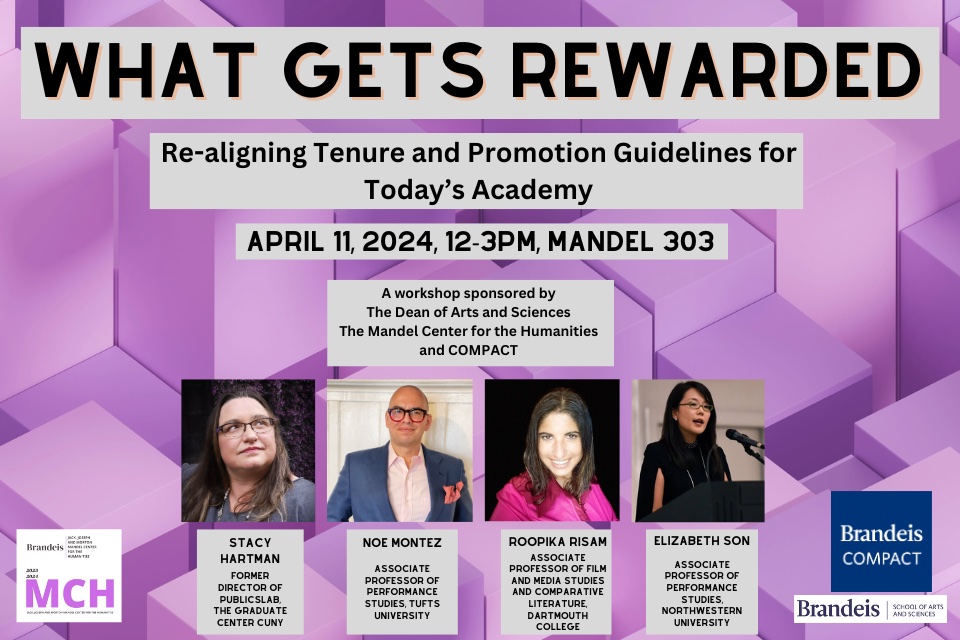
April 11, 2024
April 11, 2024 (12:00pm-3:00pm, Mandel 303)
Co-sponsored with the Dean of Arts and Sciences and COMPACT
Speakers:
-
Stacy Hartman, former Director of PublicsLab, The Graduate Center CUNY (2018-2023)
-
Noe Montez, Associate Professor of Performance Studies, Tufts University
-
Roopam Risam, Associate Professor of Film and Media Studies and Comparative Literature, Dartmouth College, author of “Revaluing the Humanities: Rethinking Faculty Reward Structures and Removing Barriers to Faculty Diversity”
-
Elizabeth Son, Associate Professor, Northwestern University, Performance Studies, ACLS Scholars and Society Fellow
Around the country, faculty are increasingly working on public-facing and community-engaged research, writing and collaborations, and university administrators, professional societies, and foundations are advocating for work that engages larger audiences and meets societal needs. And yet, in many institutions, tenure and promotion are still evaluated primarily based on a specific output: journal articles and/or academic monographs.
What Gets Rewarded? Updating Tenure and Promotion Guidelines for Today’s Academy offers Brandeis faculty the opportunity to learn more about national discussions on the importance of public-facing and community engaged scholarship.
The workshop will begin with a moderated panel discussion with four faculty and higher ed professionals who have been actively working on this issue at other campuses. We will then gather in small groups to consider how tenure and promotion guidelines at Brandeis could be changed to better account for publicly-facing and community engaged research and teaching.